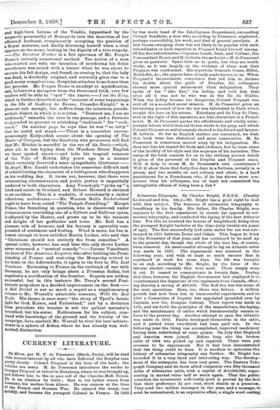CURRENT LITERATURE.
Ths /Zeros, par M. F. de Pressense (Stock, Paris), will be read with intense interest by all who have followed the Dreyfus case pretty closely. Colonel Picquart is the hero of the book ; the villains are many. M. de Pressense introduces the reader to Georges Picquart at school in Strasburg, where he was brought up, and follows him to the in pace cell of the Cherche•Midi Prison. Re is an Alsatian by birth ; that is, his father comes from Lorraine, his mother from Alsace. He was sixteen at the time of the French and German War. He entered the Army, rose quickly, and became the youngest Colonel in France. In 1893 he was made head of the Intelligence Department, succeeding Colonel Sandherr, a man who, according to Pressenee, neglected. perhaps unavoidably, his work, and died of general paralysis. A. new broom sweeping clean was not likely to be popular with such subordinates or such superiors as Picquart found himself among. Of the five subordinates—Captains Lauth, rank, and Valdant, the Commandant Henri, and M. Gribelin the archivist —M. de Praesepe& gives us portraits. Space fails us to quote, but they are worth study, as it was largely on the evidence of these men that Picquart was condemned. His superiors, Generals Gonse, Billot, Boisdeffre, /to., the papers have already made known to us. When Picquart's inconvenient conscience first led him to declare his doubts about the guilt of Dreyfus, his colleagues showed more cynical amusement than indignation. They spoke of his " idee fire," his hobby, and told him that after all it was not he who was in the Ile du Diable. When the hobby became too dangerous, Colonel Picquart was sent off on a so-called secret mission. M. de Pressense gives an interesting account of how the net was fabricated in Paris which caught the hero on his return. Esterhazy and du Paty de Clam,, seen in the light of this narrative, are like characters in a French novel. M. de Pressense quotes the affectionate and wholly unim- portant letters which General Gonse wrote to his prey, and which Colonel Picquart so unfortunately showed to his friend and lawyer. M. Leblois. So far as English readers are concerned, we wish this book were less rhetorical and more consecutive. M. de Pressense is sometimes carried away by his indignation. He does not lose his regard for facts and evidence, but he loses some• of the lucidity of his style and the sequence of his narrative. The. value of the book consists for us in the striking picture which it gives of the personnel of the Dreyfus aid Picquart cases. Will it help to rouse M. de Pressenses own countrymen ? Will it show them that forty-five days in a fortress, seventy in Is prison, and two months on end solitary and silent, is a hard punishment for a Frenchman who, if he has shown more °oar science than his colleagues, has at least not committed the unforgivable offence of being born a Jew






















































 Previous page
Previous page